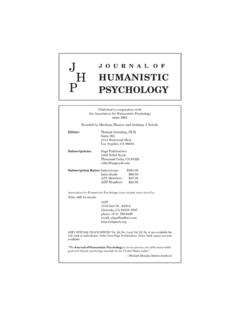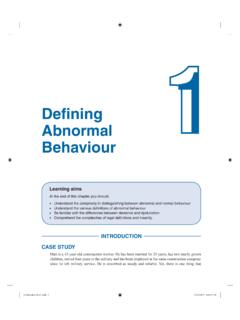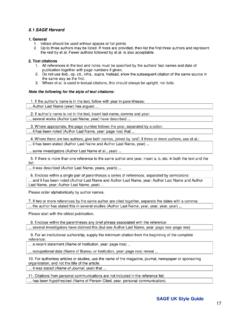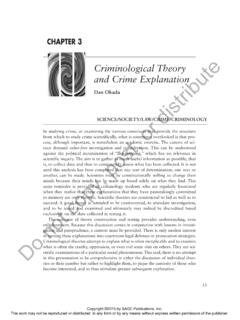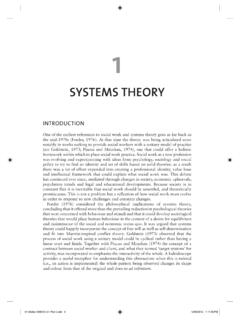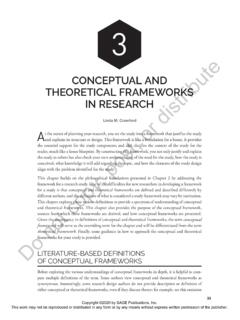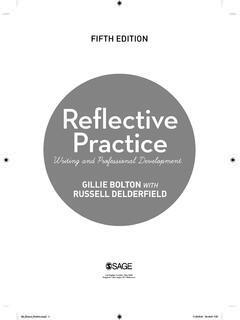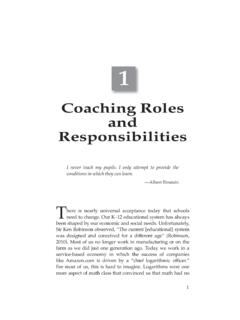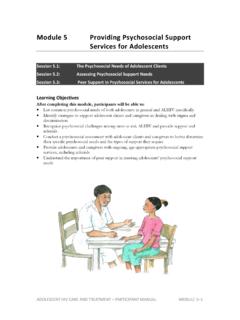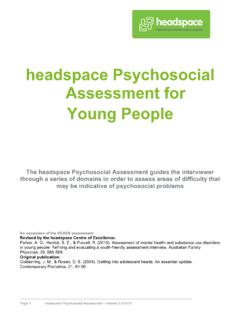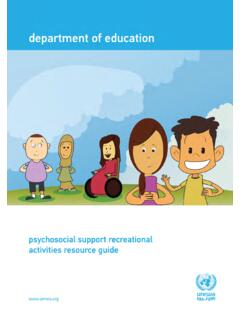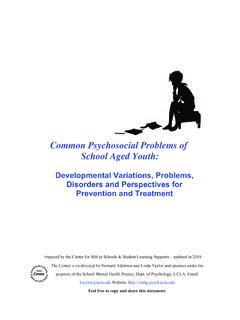Transcription of Psychosocial Interventions in Mental Health Nursing
1 Psychosocial Interventions in Mental Health Nursing00_Walker - Psychosocial 110/16/2014 6:15:22 PM4 Chapter 1An introduction to Psychosocial interventionsWendy TurtonNMC Standards for Pre-registration Nursing EducationDomain 1: Professional Mental Health nurses must work with people in a way that values, respects and explores the meaning of their individual lived experiences of Mental Health problems, to provide person-centred and recovery-focused All nurses must fully understand the nurse s various roles, responsibilities and func-tions, and adapt their practice to meet the changing needs of people, groups, com-munities and 2: Communication and interpersonal skillsMental Health nurses must practise in a way that focuses on the therapeutic use of self.
2 They must draw on a range of methods of engaging with people of all ages experiencing Mental Health problems, and those important to them, to develop and maintain therapeutic rela-tionships. They must work alongside people, using a range of interpersonal approaches and skills to help them explore and make sense of their experiences in a way that promotes All nurses must use therapeutic principles to engage, maintain and, where appropriate, disengage from professional caring relationships, and must always respect professional Mental Health nurses must use their personal qualities, experiences and interpersonal skills to develop and maintain therapeutic, recovery-focused relationships with people and therapeutic groups.
3 They must be aware of their own Mental Health , and know when to share aspectsNMC Essential Skills Clusters (ESCs)Cluster: Care, compassion and communication6. People can trust the newly registered graduate nurse to engage therapeutically and actively listen to their needs and concerns, responding using skills that are helpful, providing information that is clear, accurate, meaningful and free from - Psychosocial 410/16/2014 6:15:31 PMAn introduction to Psychosocial interventions5By entry to the register:7. Consistently shows ability to communicate safely and effectively with people provid-ing guidance for Communicates effectively and sensitively in different settings, using a range of methods and aimsAfter reading this chapter, you will be able to: define what Psychosocial Interventions (PSIs) are and their role in effective, person-based Mental Health care; provide opportunities to consider Mental Health care within a Psychosocial framework; clarify the theoretical underpinnings of PSIs.
4 Consider the challenges of delivering PSIs in routine Mental Health : Psychosocial interventionsCase studyMarianne lives with recurrent depression and this time round has been off sick from her job for five months; this latest episode of low mood has caused her to become anxious about returning to work; she has lost confidence in herself and wonders how she will cope with the inevitable questions from her work colleagues. Marianne received a comprehensive Psychosocial package of care from her Mental Health team. Working alongside Marianne, her care team identified that to promote and sustain recovery, she needed appropriate but minimal medication to support her mood. This was as an adjunct to a course of CBT for her depression, to enable Marianne to understand her vulnerability to depression and learn skills to prevent relapsing into a further episode.
5 Marianne s husband received support from the carer s support worker so that he could understand more about depression and so be a pivotal support for Marianne s recovery. Vocational support was given to Marianne and her employer s HR department to support a staggered return to her workplace and Marianne received support with accessing the local leisure centre to begin increasing her level of exercise. Lastly, Marianne was also supported to access bibliotherapy to develop her confidence in managing her mood vulnerability and well-being. Marianne has been discharged for two years now and has not experienced a relapse into Interventions are a group of non-pharmacological therapeutic Interventions which address the psychological, social, personal, relational and vocational problems associated with Mental Health disorders.
6 Psychosocial Interventions address both the primary symptoms of the Mental Health problem and the secondary experiences which arise as a consequence of the Mental Health problem; as such PSIs are a person-based intervention rather than a solely symptom-based treatment. There 02_Walker - Psychosocial 510/16/2014 6:15:32 PM6 Chapter 1are many different therapeutic models and techniques that fall under the umbrella of PSIs such as cognitive behavioural therapy (CBT), dialectical behavioural therapy (DBT), supported employ-ment, and peer support , and we will return to these different techniques and models later in the chapter; some are termed psychological therapies but they do come under the PSI PSIs offered to the person experiencing Mental Health difficulties will depend on the type of problem they are experiencing and their comprehensive needs, taking into account the impact that the Mental Health problem has had on their lives.
7 Psychosocial Interventions take an overview of the person s unique situation, which is why a comprehensive and collaborative assessment process is necessary. Interagency working is also necessary because the various forms of PSI offered to the individual may come from a number of different sources. For example, someone experiencing psychosis and living with their family may be offered cognitive behavioural family Interventions work (CBFI), while someone living with emotionally unstable personality disorder may be offered DBT; both may be offered vocational or educational support and possibly peer support with a view to reducing isolation. The choice is supported through the evidence base for the various therapies and Interventions and the findings which support efficacy of the Interventions .
8 Following systematic review of available evidence, the National Institute for Health and Care Excellence (NICE) Guidelines for various Mental Health disorders also recommend specific matter what model or technique is utilised, the aim of PSIs is to promote, support and main-tain recovery by providing: a framework for a comprehensive and meaningful assessment ensuring all elements of experience which are pertinent to promoting and maintaining recovery are covered; support which is meaningful and psychotherapeutic; a framework for developing a bio- Psychosocial understanding of the person s experience, developed collaboratively with the person; psychological Interventions which reduce distress; psychological therapy to explore personal psychological vulnerabilities which leave a person open to ongoing Mental Health problems; Psychosocial Interventions which reduce the interference the Mental Health difficulties have on the person s life; support to reconnect with the social world and so reduce the deleterious impact of social exclusion and isolation; support to consider educational and employment opportunities; support to regain or develop skills which assist in self-care and activities of daily life; cognitive remediation to enhance concentration and cognitive studyChelsea is 29 years old.
9 Chelsea dropped out of school when she was 15 and spent three years sofa surfing with friends to avoid sleeping at home. Chelsea was sexually abused by two of her mum s short-term partners when she was 8 and 14, and emotionally abused and neglected by her mum over many 02_Walker - Psychosocial 610/16/2014 6:15:32 PMAn introduction to Psychosocial interventions7years. Chelsea found employment in various caf s and takeaways and has thrown away her dream of going to university and making something of her life. Chelsea was finally re-housed by the council but ten years on, finds her life can still be chaotic. She has been self-harming by cutting since she was 9, and has had periods when she minimised this and times when she was self-harming frequently.
10 She has moved the body area of cutting so that it is not visible to her customers and her employers. People at work view her as bubbly, if more than a little crazy ; she is very impulsive and can fly off the handle sometimes. They also note that Chelsea s mood is very changeable from extremes of happiness to morose-ness and anger, often triggered by the slightest of things. At home Chelsea often becomes distraught and uses alcohol to help her cope with her feelings. She does not cope well with endings or change, and is frequently lost in self-loathing and often feels alone and misunderstood. The friends she makes seem to drift away when they get to know her and Chelsea believes this is because they see her as damaged; the truth is more that they find her inconsistent mood and behaviour difficult to tolerate.
